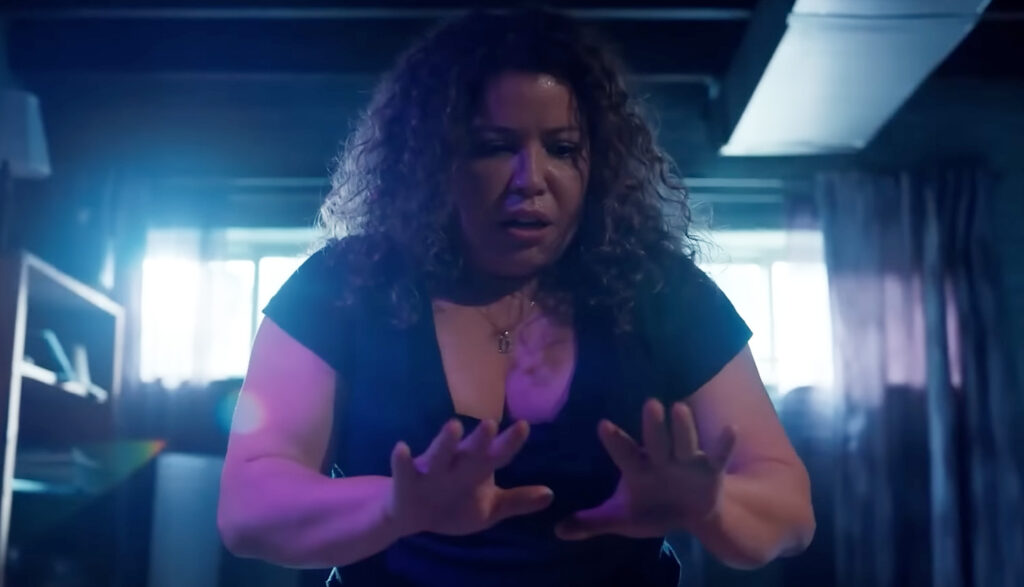
The Fall and Rise of Reggie Dinkins
‘The Fall and Rise of Reggie Dinkins’ is a mockumentary speaking to second chances—though audiences may not want to give it a first chance.

Dolores Roach feels misunderstood.
She’s not the monster that people say she is. So she killed a few people. So she dismembered them. So her pal, Luis, cooked up the meat in his increasingly tasty empanadas. But hey, can you blame her?
Well, OK, maybe you can. Still, Dolores wants to tell us her story. Get into its guts, if you will.
It’s not as if Dolores planned to become a serial killer. It was never a part of her vision board.
But ex-convicts only have so much they can do with their post-prison lives. And Dolores’ own choices were pretty limited from the get-go.
Dolores spent 16 years in the slammer on some drug-and-assault charges. Once out, her plan was to look up her old boyfriend, but he’s up and disappeared. In fact, all her old friends have. Her old neighborhood of Washington Heights has gentrified—turning from crime-riddled ‘hood to posh hipster hangout.
Only one business remains from Dolores’ old life: The Empanada Loca, a family restaurant now owned by Luis Batista. Luis offers to let Dolores crash in his basement apartment, rent free, as long as she wants. Soon she’s running her very own massage parlor down there—working out the knots and kinks from the neighborhood’s self-indulgent citizens.
Everything goes great—for a whole week.
But then Luis’ landlord comes around, demanding, y’know, rent money and stuff. Dolores offers the guy a wad of cash and a free massage for a weeklong extension. But when the landlord gets a bit handsy … well, let’s just say she forecloses his account.
See? It could’ve happened to anyone. Anyone. And with a body to dispose of and a restaurant upstairs … well, one thing led to another.
Sure, Dolores made a few mistakes. But can you blame her?
Well, Plugged In can.
The Horror of Dolores Roach is based on a 2018 podcast of the same name. But its core DNA is pulled right from the Broadway musical Sweeney Todd: The Demon Barber of Fleet Street. It takes the raw meat of London’s most notorious shaver, boils it up in 21st-Century New York City and seasons it with a dash of social commentary—serving it to audiences on a big, bloody plate.
And yes, there is blood. And guts. And body parts. And saws. And … laughs? Amazon’s Prime Video positions this as something of a dark comedy. An example: Luis, in the bathroom, holds a severed arm. “Hey, you wanna give me a hand?” he asks Dolores.
But those concerned about problematic content leaking out of their screens won’t be laughing much. Even if Dolores and Luis weren’t killers—if they were simply making a killing on innocent caramel empanadas—the problems in this show would be far from fleeting.
Drug use is pervasive, and it’s seen as more or less benign (particularly in the realm of marijuana, the drug of choice for Dolores, Luis and, it would seem, most of Washington Heights). The amount of language found here (including f- and s-words) would feel excessive in an R-rated, two-hour film. In a 30-minute episode?
Ironically, the show itself warns us from the outset that, really, we should watch something else.
Dolores sidles up to another woman who asks, timidly, whether Dolores is going to kill her. “Worse,” Dolores says. “I’m going to tell you s— you can never unknow. S— you can never wash off.”
The woman has no choice but to listen. But we do. And we’d be wise to do what this woman would obviously like to do: Run as fast and as far as we can.
An actress takes a bow after playing the notorious Dolores Roach on stage. But she discovers the “real” Dolores Roach—the infamous serial killer—waiting for her in her dressing room. “I’m not the monster you’re making me out to be,” Dolores tells the actress. “I’m just like you.” And then she tells her—and the viewer—her story.
That story begins with Dolores as the girlfriend of a powerful neighborhood drug dealer. When Dolores is busted and sent to prison, she refuses to snitch on her beau. But 16 years later, when she’s finally released, the drug dealer has vanished. In desperation, Dolores connects with Luis, one of her few remaining neighborhood friends.
We see snippets of the violence to come in Dolores’ story, but for the most part it’s only suggested. The stage play is far more grotesque, with severed limbs and fake blood adorning the stage. (The blood-stained actress holds what appears to be a human heart in her hands.) Luis cuts up slimy, oozy meat, and a bit of chicken goop lands on Dolores’ face. Dolores is bloodied a bit in her confrontation with DEA agents. We learn that the bed that Dolores sleeps on in Luis’ basement apartment was the same bed in which Luis’ father died.
A pre-prison Dolores smooches and makes out with her boyfriend. In flashback, we see that Luis was a teen when Dolores was Washington Heights’ “queen,” and it seems that he had—and has—a crush on her. We see Dolores’ exposed shoulders. Dolores mentions her close relationship with her prison cellmate (a “handless masseuse from Philly”), though there’s no obvious indication of what their relationship entailed.
Drugs and money change hands in Washington Heights, both before and after Dolores’ prison term. We see several people, including Dolores and Luis, smoke marijuana. When Dolores learns that Luis gets his marijuana from a medical dispensary in Colorado, she muses that “Even the drug business got gentrified.” Listening to Luis rant while under the influence of weed reminds Dolores of her father “on his second whiskey.”
We hear a reference to Jehovah’s Witnesses. Characters say the f-word nearly 40 times and the s-word about 30. We also hear “a–,” “b—ch” and “d—n,” along with a half-dozen misuses of God’s name (two with “d—n”) and one abuse of Jesus’ name.
Dolores tries to find a job as a masseuse, but her prison record makes employment difficult. Luis suggests that she open her own massage parlor below the restaurant, and clients soon start trickling in. But when Luis’ landlord shows up demanding his rent money, Dolores realizes that her fresh start might be threatened.
Dolores tells clients to undress to their “level of comfort,” and we see two men strip in her office. One apparently strips completely naked (we don’t see anything, and Dolores puts a towel over his rear), while another undresses down to his briefs-style underwear and lies down on the massage table face up—apparently assuming that Dolores isn’t really so much a masseuse but a sex worker. (He gropes her rear and makes suggestive comments, as well.) Despite Dolores’ obvious desire to be, simply, a masseuse, a prospective employer states that there’ll be “no peekaboos” or manual stimulation on the job.
We see Dolores in and after a shower, her shoulders bared. Someone calls her a “hooker.” One of Dolores’ clients is clearly gay, and he talks about the lack of good male sex partners online. (He complains that it’s impossible to have “safe bondage play with a guy you know is going to rob you.”) We hear a reference or two to sex acts.
Someone nearly breaks another character’s neck. An attack takes place largely off camera. We hear more details about how Luis’ father died, including an allusion to the nastiness of the mattress he died on. A step breaks when someone steps on it.
Luis and Dolores smoke marijuana. Someone offers Dolores a job selling weed to the moms of Washington Heights. (Dolores is told they use it to go to sleep.) We see a cross hanging around someone’s neck and a reference to Darwinism.
Characters say the f-word and s-word about 20 times each. And, of course, there’s a smattering of other profanities, as well, including “a–,” “b–ch,” “h—,” “d–n” and the c-word. God’s name is misused five times (four with the word “d–n”), and Jesus’ name is abused once.

Paul Asay has been part of the Plugged In staff since 2007, watching and reviewing roughly 15 quintillion movies and television shows. He’s written for a number of other publications, too, including Time, The Washington Post and Christianity Today. The author of several books, Paul loves to find spirituality in unexpected places, including popular entertainment, and he loves all things superhero. His vices include James Bond films, Mountain Dew and terrible B-grade movies. He’s married, has two children and a neurotic dog, runs marathons on occasion and hopes to someday own his own tuxedo. Feel free to follow him on Twitter @AsayPaul.

‘The Fall and Rise of Reggie Dinkins’ is a mockumentary speaking to second chances—though audiences may not want to give it a first chance.

As far as spy thrillers go, The Night Agent is par for the course. But as far as family viewing goes, it might be better to blacklist this one.

AMC+ brings to life a murder-mystery series set in New Mexico, steeped in Navajo ways and filled with dark magic.

‘Strip Law’ is Netflix’s next carbon-copy adult animated comedy whose unoriginality extends even into its crass content.